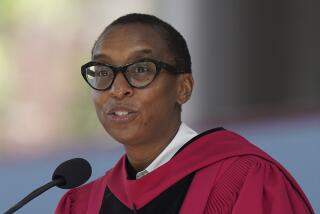King’s Scholarly Works Questioned : Research: A Stanford historian asserts plagiarism, saying the civil rights failed to credit sources in his writings.
- Share via
NEW YORK — Martin Luther King Jr. borrowed words and ideas extensively from other sources for his doctoral dissertation and other writings without giving proper citations, a Stanford University historian says.
“Several of King’s academic papers, as well as his dissertation, contain numerous appropriated passages that can be defined as plagiarism,” historian Clayborne Carson asserted in an article in today’s Wall Street Journal.
The slain civil rights leader’s wife, Coretta Scott King, chose Carson to lead the Martin Luther King Jr. Papers Project, which she founded in 1984 to gather King’s papers from locations around the country and produce a multivolume collection.
King’s school papers are his most obscure and insignificant writings, but the discoveries have prompted debate, anguish and soul-searching among scholars who have worked on the project.
Associate Editor Ralph Luker, a follower of King who was jailed during a civil rights protest, said he suffered “deep anxieties” over the findings and “many hours of lost sleep.”
David Garrow, a member of the project’s advisory board and author of “Bearing the Cross,” a Pulitzer Prize-winning biography of King, said the discovery “had a tremendously shaking, emotional impact on me.”
“To me, 98% of what makes it most interesting is: Why did he do it? Was he so insecure that he thought this was the only way to get by? It’s disconcerting, because it is fundamentally, phenomenally out of character with my entire sense of the man.”
The questions about his academic work surfaced in late 1987, nearly 20 years after his death, when evidence was discovered by a Stanford graduate student who was working for the King Papers Project.
In some parts of the dissertation King wrote as a doctoral candidate at Boston University, he lifted passages nearly verbatim from other texts without using any quotation marks or footnotes, the newspaper reported.
After that discovery, Carson told his staff to check the sources of nearly of all King’s academic work.
It became apparent that throughout his seven years of graduate school, King’s essays--especially in his major field of graduate study, systematic theology--often borrowed from other sources without citing them as required by academic policy, the paper said.
When the problem was found, three project editors and half a dozen student researchers worked for nearly two years annotating all of King’s 150 or so academic papers.
More to Read
Sign up for Essential California
The most important California stories and recommendations in your inbox every morning.
You may occasionally receive promotional content from the Los Angeles Times.













